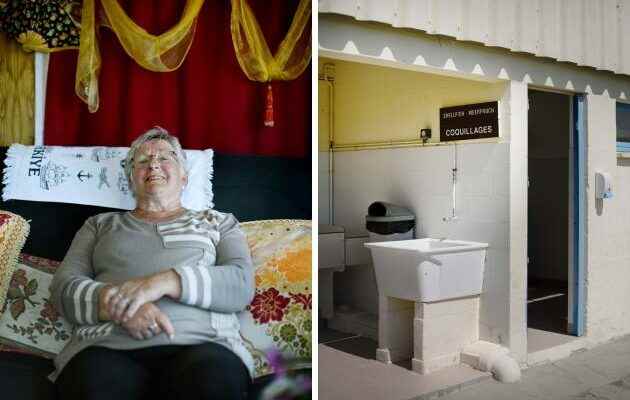At 78, Monique Le Barc enjoys a little happiness: a mobile home at the Quiberville campsite, a modest seaside resort in Seine-Maritime. It is at the end of the field, facing the toilets where there are five wash basins for dishes, four for laundry and one for shellfish. When the campsite reopens in April, she decorates the terrace which will welcome friends, family and glasses of aniseed.
This is probably the last time. The campsite is going to move for the very reason that made it so successful: the English Channel is on the other side of the street and the Saâne, a river, flows behind an embankment. It is threatened with submersion, by one, and flood, by the other, and climate change worsens its situation. A new campsite is under construction, set back from the sea, as part of a broad plan to bring sea and land together rather than blocking it with pebbles, dykes and embankments, as has always been done.
Monique Le Barc does not agree, because the future campsite will not accept “residents” like her or her decrepit mobile home; but Quiberville is a model, and an extremely rare exception. The campsite move portends a not-so-distant future, climate change experts say. The proliferation of violent events could require moving land installed in the 1970s, when the coastal law and the protection of natural areas did not exist. In addition to climate change, there is the new doctrine of the State in the face of the risks of marine submersion: no more protection, considered costly and ineffective in the medium term, place for adaptation.
The camping sector, which accounts for half of overnight stays in collective accommodation each summer in France, is concerned about the sustainability of its largest establishments. She says she lacks the legal tools to adapt – and survive. In its own way, the fate of motorhomes and mobile homes on the French coast sums up the immense complexity of adapting to climate change, involving climatologists, elected officials, town planners, lawyers, architects, business leaders and administrations.
“Don’t wait for a new Xynthia”
The Ministry of Tourism estimates that 369 campsites are threatened by the retreat of the coastline. Nearly double the bite on the 100-meter coastal strip, and a quarter of the 7,800 French campsites are exposed to a natural risk – marine submersion, coastal erosion, flooding, even falling rocks. These campsites being the best placed, they represent half of the total attendance, according to the National Federation of Outdoor Hotels.
You have 76.68% of this article left to read. The following is for subscribers only.
